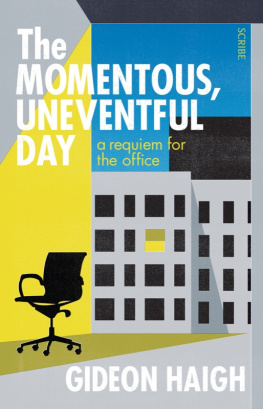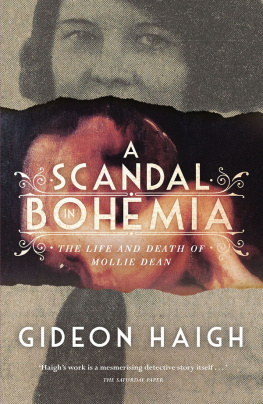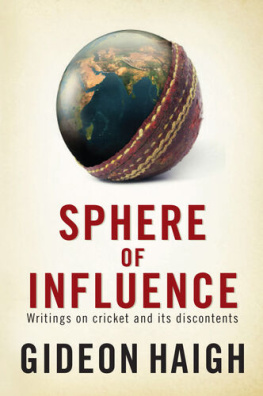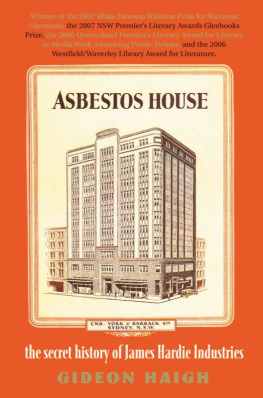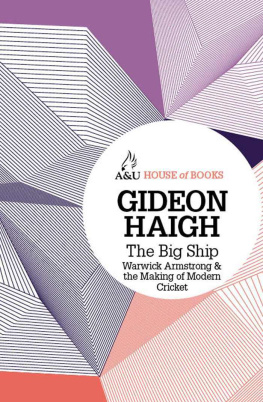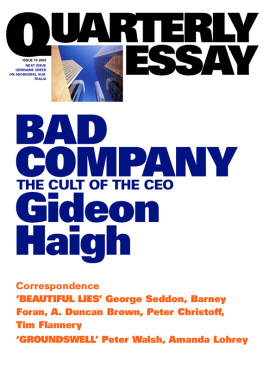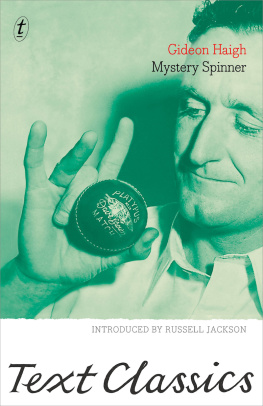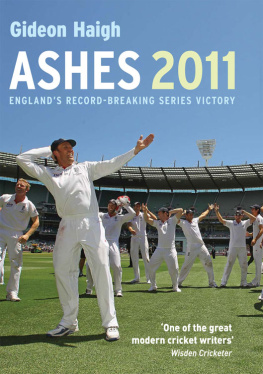Gideon Haigh - The Momentous, Uneventful Day
Here you can read online Gideon Haigh - The Momentous, Uneventful Day full text of the book (entire story) in english for free. Download pdf and epub, get meaning, cover and reviews about this ebook. year: 2020, publisher: Scribe Publications Pty Ltd, genre: Detective and thriller. Description of the work, (preface) as well as reviews are available. Best literature library LitArk.com created for fans of good reading and offers a wide selection of genres:
Romance novel
Science fiction
Adventure
Detective
Science
History
Home and family
Prose
Art
Politics
Computer
Non-fiction
Religion
Business
Children
Humor
Choose a favorite category and find really read worthwhile books. Enjoy immersion in the world of imagination, feel the emotions of the characters or learn something new for yourself, make an fascinating discovery.
- Book:The Momentous, Uneventful Day
- Author:
- Publisher:Scribe Publications Pty Ltd
- Genre:
- Year:2020
- Rating:3 / 5
- Favourites:Add to favourites
- Your mark:
- 60
- 1
- 2
- 3
- 4
- 5
The Momentous, Uneventful Day: summary, description and annotation
We offer to read an annotation, description, summary or preface (depends on what the author of the book "The Momentous, Uneventful Day" wrote himself). If you haven't found the necessary information about the book — write in the comments, we will try to find it.
The Momentous, Uneventful Day — read online for free the complete book (whole text) full work
Below is the text of the book, divided by pages. System saving the place of the last page read, allows you to conveniently read the book "The Momentous, Uneventful Day" online for free, without having to search again every time where you left off. Put a bookmark, and you can go to the page where you finished reading at any time.
Font size:
Interval:
Bookmark:

THE MOMENTOUS, UNEVENTFUL DAY
Gideon Haigh has been a journalist since 1984, and The Momentous, Uneventful Day is his fortieth book. His The Office: a hardworking history won the 2013 Douglas Stewart Prize for Non-Fiction.
Scribe Publications
1820 Edward St, Brunswick, Victoria 3056, Australia
2 John St, Clerkenwell, London, WC1N 2ES, United Kingdom
3754 Pleasant Ave, Suite 100, Minneapolis, Minnesota 55409, USA
First published by Scribe 2020
Copyright Gideon Haigh 2020
All rights reserved. Without limiting the rights under copyright reserved above, no part of this publication may be reproduced, stored in or introduced into a retrieval system, or transmitted, in any form or by any means (electronic, mechanical, photocopying, recording or otherwise) without the prior written permission of the publishers of this book.
The moral rights of the author have been asserted.
9781922310491 (Australian edition)
9781913348700 (UK edition)
9781925938708 (ebook)
Catalogue records for this book are available from the National Library of Australia and the British Library.
scribepublications.com.au
scribepublications.co.uk
CONTENTS
AUTHORS NOTE
The Momentous, Uneventful Day arises from a book I wrote a decade ago. The Office: a hardworking history (2012) is a big, chunky, panoramic, and global history my late friend John Clarke said it should come complete with an office to read it in. Unfortunately, its now difficult to obtain, but my interest in the subject is an abiding one, and the visit I describe in the opening paragraph of this book started me on this somewhat more concise and argued requiem that confines itself to the Anglosphere and the last two hundred years. Should you wish to trace the story to ancient Egypt, or, youre curious about office culture in Japan, Russia, India, France, etc, and are prepared to wait a bit, there are still print-on-demand and ebook versions of The Office available: https://www.mup.com.au/books/the-office-paperback-softback. And if you must know, for some are bound to ask, The Momentous, Uneventful Day was written mainly in my kitchen.
He was in love with his work, and he felt the enthusiasm for it which nothing but the work we can do well inspires in us. He believed that he had found his place in the world, after a good deal of looking, and he had the relief, the repose, of fitting into it. Every little incident of the momentous, uneventful day was a pleasure in his mind, from his sitting down at his desk till his rising from it an hour ago.
William Dean Howells, The Rise of Silas Lapham (1885)
All the dreams you used to chase
All the things you thought were great
Somethings missing, you cant place
Smiles missing from your face
Nothing here but empty days
But you dont have the time
To think about why
You feel this way
You got to wake up the next day
For your
Office Life.
Jreg (Radical anti-centrist Hyper-meta-post-post-modernist Post-satirist YouTuber Greg Guevara), Office Life (2020)
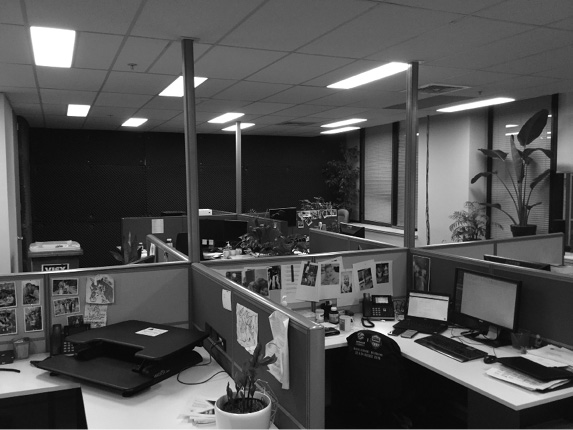
INTRODUCTION
In May 2020, at the tightest point of the citys first COVID-19 lockdown, I ran a furtive errand to the headquarters of a consulting firm in Melbournes central business district. It was intended as a brief visit for the collection of some work that happened to be on a friends desk. We met outside, looked each way down the deserted street, then passed by a somnolent security guard and communal sanitiser bottle into an empty foyer where lifts were clustered, doors agape.
Quiet makes one unusually conscious of ones own noise: as a pass admitted us to the relevant floor, we muted our voices, trod warily. It turned out that we were not completely alone. A couple of other figures were distantly visible, on their own hasty missions. Otherwise, the scene was faintly disorienting. The lights were dimmed, the air heavy. Chairs did not sit flush to desks, as though their occupants would return momentarily; desks were still scattered with personalising marks and mementoes; upturned coffee cups remained in the kitchens drying rack; walls featured notices for abandoned functions and events. As we loitered self-consciously, my friend and I searched for the apposite cultural allusion, to encapsulate the sense of activities suddenly, mortally foreclosed. Pompeii? The Mary Celeste ? The opening scenes of Double Indemnity , or the closing scenes of On the Beach ? Unable to quite put my finger on it, I took a photograph or two. After all, it was a scene the like of which might not be seen again. Or maybe it would.
Our generation falls in readily with the chagrined proposition that we live in end times. It started with Fukuyamas positing of the end of history; it continued with predictions, by various popular pundits, of the ends of science and of faith, of oil and of coal, of the United States, the United Kingdom, and Europe respectively. A looming end of globalism is a popular theme among opinion-makers; a comic book and television series has already embraced The End of the Fucking World . By this millenarian measure, the end of the office might seem a relative triviality. Yet when COVID-19 swept the planet in the first half of 2020, the possibility caught on with immediate force. Lockdown offered a foretaste of commercial and professional work occurring not under shared ceilings in lookalike cubicles but in the home, connected by the gossamer of communications technology. In the everyday run of events, globalism is experienced only diffusely. Nobody starts a conversation with, So, reckon we should carry on with this globalism? But anyone can partake of, Hows working from home going? Or: Hows it feel not having to go to the office every day?
Answers to these questions were heard with surprising optimism. Australia accorded with global trends that found workers not just comfortable with remote working, but better off for it and not merely for being freed from anxiety around touching infectious lift buttons or sharing viral coffee cups. An NBN survey of 1,000 respondents in April found that four in five had experienced an enhanced balance of work and life, and two-thirds expected to work from home more in future. A Bates Smart survey of 1,000 respondents in May found that three-quarters felt just as productive at home as at work, and more than half believed that at home they were deep thinking better; only 12 per cent wanted to work full time in an office in future. Eighty-one per cent of those responding to The Guardians Life After Lockdown survey in June agreed that employees should be allowed to work from home after the crisis. Morgan Stanley research reported in The Times in August showed only 16 per cent of workers surveyed worldwide pining for a return to the office full time post the pandemic.
Once the adaptable workers had allayed employer concerns about their at-home productivity, the C-suite offered even more positive global reviews. Google and Facebook, those glasses of corporate fashion, found the transition so seamless that they freed employees to work remotely until years end; Twitter, Salesforce, and Square extended this permission to forever. The trend had been set by social media businesses such as Buffer and WordPress, who in the last few years had already abandoned offices in favour of fully distributed work. It helped, of course, that such employees were already fluent in the patois of Zoom video-conferencing, Slack instant-messaging, Google Meets, and Microsoft Teams. But the tools proved intuitive enough for most people, and the strangeness of conducting work through a screen that recalled the opening credits of The Brady Bunch abated relatively quickly.
Next pageFont size:
Interval:
Bookmark:
Similar books «The Momentous, Uneventful Day»
Look at similar books to The Momentous, Uneventful Day. We have selected literature similar in name and meaning in the hope of providing readers with more options to find new, interesting, not yet read works.
Discussion, reviews of the book The Momentous, Uneventful Day and just readers' own opinions. Leave your comments, write what you think about the work, its meaning or the main characters. Specify what exactly you liked and what you didn't like, and why you think so.

